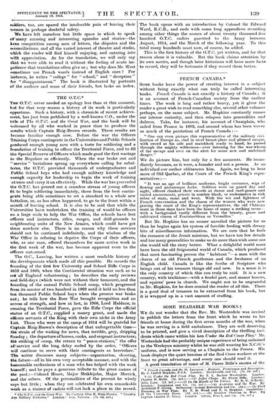FRENCH CANADA.* SOME books have the power of creating interest
in a subject without being exactly what can truly be called interesting
books. French Canada is not exactly a history of Canada ; it is an account of French-Canadian society from the earliest
times. The work is long and rather heavy, yet it gives the reader a great wish to read something else, several other volumes perhaps, on the same subject. Mr. Hopkins constantly muses our intense curiosity, and then relapses into generalities and dulness. Take, for instance, his account of Champlain, who sailed from France in 1603, and around whom has been woven so much of the patriotism of French Canada :-
" One can even picture this representative of the military civi- lization of Europe as, clad in steel breast-plate and plumed casclue. with sword at his side and matchlock ready to hand, he passed through the mighty wilderness—ever listening for the war-whoop of the savage and ever on the alert for some new and undefined danger."
We do picture him, but only for a few moments. He imme- diately becomes, as it were, a founder and not a person. As an individual our author obliterates him. Again, we long to hear more of Old Quebec, of the Court of the French King's repre- sentatives :—
" It was an age of brilliant uniforms, bright costumes, wigs of Rowing and picturesque locks. Soldiers were on guard day and night, officers -clanked their swords at dance and card-games and varied amusements, priests in sombre black, or ecclesiastics in rich robes of state, came and went. With the wit and lightness of French conversation and the charm of the women who were now gracing the court of the King's representatives, the old Chateau must in those days have been the home of many a striking seene- with a background vastly different from the beauty, grace and
cultivated charm of Fontainebleau or Versailles." •
But Mr. Hopkins has no sooner unveiled the picture for us than he begins again his system of forcible feeding with dreary bits of miscellaneous information. We are sure that he feels the romance of the Jesuit missions, but we have too few details and too many generalities to make us do more than wish some one else would tell the story better. What a delightful world must have been the old Seigneurial world of Canada, which produced that most fascinating person the " habitant "—a man with the charm of an old French gentleman and the freshness of an English child. Canada is like the Scribe of Scripture who brings out of his treasure things old and new. In a sense it is the only country of which this can truly be said. It is a new country, with traditions—with a feudal past, and manor houses, and squires' pews in church. We ought not to be ungrateful to Mr. Hopkins, for he does remind the reader of all this. There is a good deal of treasure to be extracted from his book, but it is wrapped up in a vast amount of stuffing.


















































 Previous page
Previous page